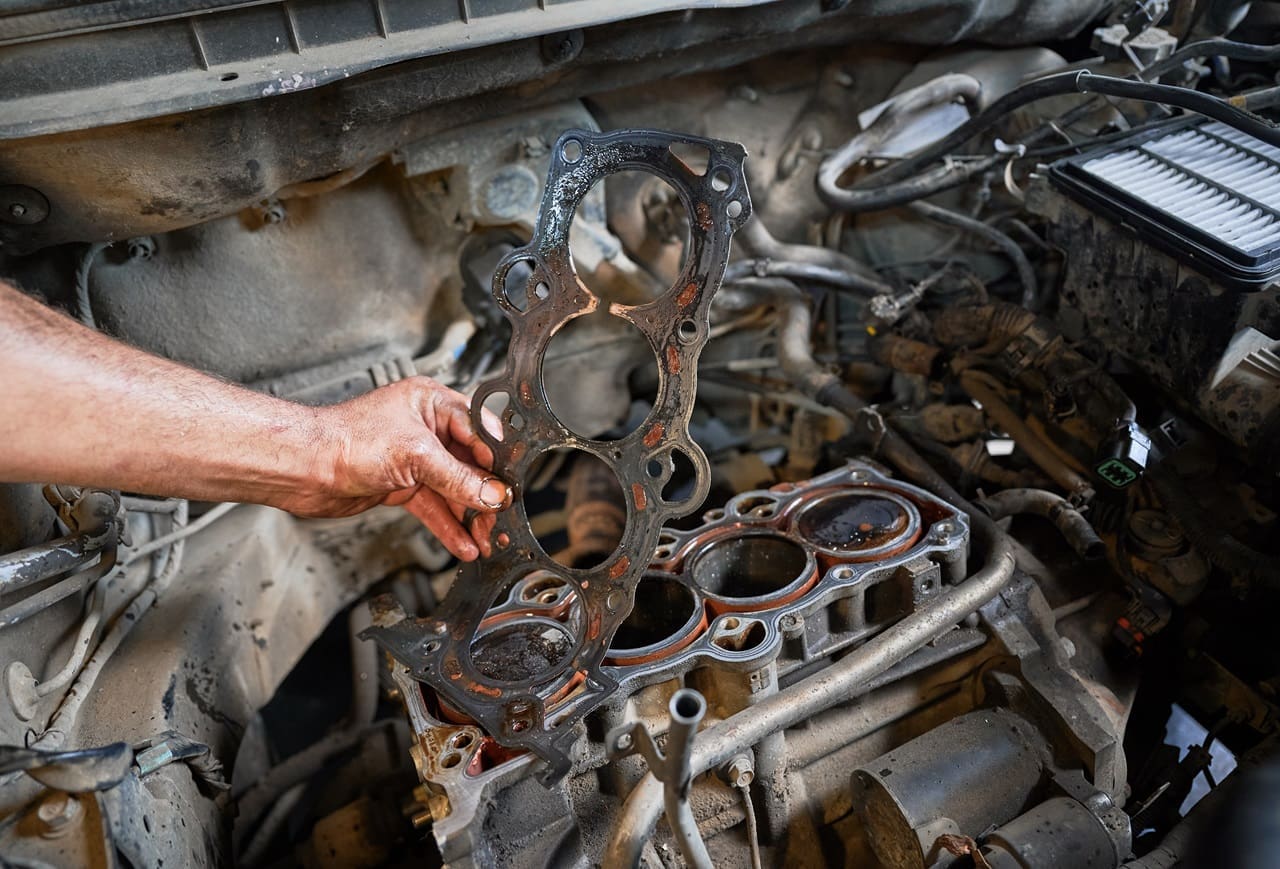When it comes to head gaskets, one of the most common questions we receive at Colony One Auto Center is, “Why do head gaskets blow?” Head gaskets play an important role in your car’s engine and if one “blows” — i.e., leaks — it can cause other areas in your engine to degrade.
Obviously, this is something you want to avoid. So before you see that check engine light flashing, let’s take a few minutes to discuss three common ways you can blow a head gasket.
What is a head gasket, and what do head gasket do?
Before we can properly answer the question, “Why do head gaskets blow?” let’s go over the function a head gasket plays in keeping your car running smoothly.
Head gaskets are located in between your car’s engine block and cylinder head and have two primary functions. The first of these is to seal in the internal combustion process. The second is to prevent coolant and oil from mixing as they move the engine block and cylinder head. Put more simply, the head gasket contains and protects the combustive process that makes your car go.
The three top reasons why head gaskets blow:
1. Your head gasket wasn’t installed correctly or was poorly manufactured
An unfortunate but very real answer to the question, “Why do head gaskets blow?” is that they might have been installed incorrectly. A head gasket’s important jobs and complicated location mean that even little mistakes in installations can cause big issues in the long run. Common head gasket installation errors include:
- Improper head bolt tightening and torque and/or even use of old head bolts or head bolts with damaged threads.
- Incorrect use of head gasket sealer.
- Failure to clean the cylinder head and engine block before installation.
- Failure to check for aberrations on the surface of the cylinder head and engine block.
2. Your engine suffers from hot spots
A hot spot is a localized area of heat that typically forms on the cylinder head. They can also occur if your car has ignition issues or pre-ignition issues. (For more information, check out our article regarding how often to replace spark plugs).
Over time, hot spots can lessen the integrity of your head gasket or even cause your head gasket to blow. Reinforced head gaskets can help curb these issues in cars that are more prone to hot spots.
Speaking of hot spots, take a moment to learn whether or not low engine coolant affect air conditioning.
3. Your engine is overheating
By far the most common answer to “Why do head gaskets blow?” is engine overheating. When your engine overheats, the materials around your head gasket expand. Overheating can ultimately causing head gasket failure and leakage by either crushing the head gasket’s armor or causing it to erode over time.
Overheating can cause other issues besides a blown head gasket, which is just one reason it’s very important to make sure your car has regular maintenance. So, if your gasket is blown due to overheating, make sure you figure out what is causing this issue. (For example, here’s the answer to the question, “Can low oil cause overheating?”)
Does a blown head gasket ruin an engine?
People often assume that a blown head gasket equates to a blown engine, and this is because the process to fix a blown head gasket can be very expensive and time-consuming.
While in some cases, especially ones in which the head gasket issue is discovered early, replacing a blown head gasket may be enough to get your car back in healthy working order. However, if your head gasket blew a long time ago or blew due to extenuating circumstances, you may need other areas near the head gasket to be fixed and replaced, as well.
Can you drive a car with a blown head gasket?
If you’re asking “Why do head gaskets blow?” because you suspect you’re driving a car with a leaking head gasket, it’s better to get your car repaired as quickly as possible. A blown head gasket means that combustion fluids and oil can wind up where your coolants should be and vice versa. When these fluids become mixed, several issues can occur.
- Leaked engine oil lowers engine oil levels, resulting in increased friction and overheating in the engine
- Coolant that has leaked into areas with engine oil dilutes the oil, also resulting in increased friction and overheating in the engine
- Leaked coolants can ruin spark plugs and erode engine parts, resulting in the need for an engine rebuild
- Coolant which has leaked into the combustion chamber can ruin electronic sensors
- Leaked coolant results in lower coolant levels, resulting in further overheating
What should I do if I think my head gasket is blown?
Now that you know the answer to the question, “Why do head gasket blow?” what should you do? Because of where a head gasket is located, it is often very difficult to tell whether or not your head gasket is blown without disassembling part of your engine first. That’s why it’s important to seek the help of a professional at Colony One Auto Center if you believe your car is suffering from head gasket failure.
The longer you operate your vehicle with a blown gasket, the more damage you’ll put your vehicle through. We want to avoid more extensive engine issues, so the sooner you get into the shop to diagnose your problem, the better. The experienced technicians at Colony One Auto Center are here to help.
Request service online today or give us a call at 281-800-9209.
Other Helpful Resources by Colony One Auto Service:
- Why is My Car Leaking Oil?
- What is a Good Car Repair Warranty?
- Understanding Automotive Alignment
- What Does ‘SRS’ Mean in a Car?
- Texas Vehicle Inspection

